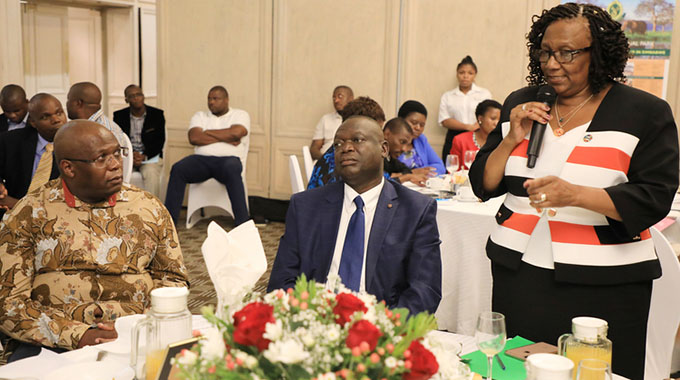Shiri warns of bad cropping season

Farirai Machivenyika and Columbus Mabika
GOVERNMENT has come up with measures to mitigate the effects of drought, with forecasts so far showing the 2018-2019 summer cropping season will be characterised by erratic rains in most parts of the country.
In a statement yesterday, Lands, Agriculture, Water and Climate Minister Perrance Shiri said the prevailing weather conditions had adversely affected land preparations, planting and job opportunities for casual labourers.
He advised farmers to plant small grains that are drought resistant and provide supplementary feeding to livestock, among a raft of measures.
“The onset of the 2018-19 rainfall season was delayed, with first effective rains being received in late November. So far, the rainfall pattern has been erratic in both space and time, especially in the southern parts of the country,” said Minister Shiri.
“The highest accumulated rainfall since the start of the season was recorded in parts of Harare, Mashonaland Central, Mashonaland East, parts of Mashonaland West and Manicaland provinces.
“The southern provinces of Masvingo, Midlands, Matabeleland North and Matabeleland South have been the most affected by the poor rainfall distribution. The rainfall received to date is below the long-term mean with exceptions of a stretch in the north-eastern part of the country and around Beitbridge in Matabeleland South. So far, the 2018-2019 cropping season has been mediocre in terms of rainfall performance across most of the country,” said Minister Shiri.
He said rainfall recorded from mid-October to date was below the long-term average.
Minister Shiri said there would be a 35 percent chance of below normal rains, a 40 percent chance of normal rains and 25 percent chance of above normal during the January to March 2019 period.
“The performance of the season, thus far, has adversely affected on-farm activities such as land preparation, planting and casual labour opportunities which are below typical levels for this time of the year. The grazing has not been spared as well,” he added.
Government came up with recommendations farmers could implement to cushion themselves from the poor rains.
“Farmers should look more into cultivation of more than one type of grain staple from sorghum, millet and maize and diversification into other early maturing crops, adoption of irrigated agriculture where opportunities permit, moisture conservation, efficient utilisation of water, supplementary feeding of livestock during the dry season, judicious management of grazing areas, improved rangeland management, planting of forage legumes for dry season supplementation, animal health interventions and vector control focusing primarily on dosing and dipping of animals among other strategic interventions,” said Minister Shiri.
He urged farmers in some regions to consider short season maize varieties to increase chances of getting harvests.
“We are also encouraging farmers to diversify into other short season crops, such as edible beans, round nuts, cowpeas, groundnuts and sweet potatoes,” said Minister Shiri.
He urged farmers to be on the lookout for pests like the fall armyworm which tend to increase in dry conditions and advised them to report to extension agents any outbreaks as they occur.
“In areas where farmers have irrigation facilities, we are strongly urging judicious water management through maintenance of the irrigation equipment to avoid water loss and unnecessary breakdowns.
“Those with irrigation facilities are also encouraged to diversify into horticultural crop production to widen the income base.
“Other efficient water utilisation techniques such as drip irrigation are also being encouraged,” he said.
Minister Shiri advised livestock farmers to manage their pastures properly.
“In the predominant livestock areas, farmers should focus on the judicious management of rangeland to avoid overgrazing,” he said.
“Farmers should also look into growing forage legumes to supplement livestock feed during the dry season as shortage of grazing will be imminent if there is no improvement in the rainfall situation. Other measures should include dry season irrigation of pastures for those with the facilities; restricted grazing of pastures during wet season, so that feed will remain for the dry season; harvest and storage of wet feed as silage; increasing amount of dry season feed from crop residues; harvest and storage of dry feed as hay,” he said.
He advised farmers to strategically manage their cattle herds.
“Above all, we are encouraging farmers and other stakeholders to look for weather bulletins which are being disseminated in 3- and 10-day bulletins. These bulletins assist farmers in making informed decisions. Farmers should work closely with their local extension agents to get more strategic advice on what could be done in these challenging times,” he said.
A forecast produced by the Southern African Regional Climate Outlook Forum shows most Sadc countries are likely to receive “normal to below-normal” rainfall for the period October 2018 to March 2019 with the exception of Tanzania.










Comments